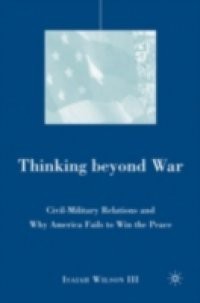Why was there a deliberate plan to fight the war in Iraq but none to win the peace? This question, which has caused such confusion and consternation among the American public and been the subject of much political wrangling over the past two years, is the focus of Lt. Col. Isaiah Wilson?s investigation. Director of the American politics, policy, and strategy program at West Point, Wilson points to a flaw in the government?s definition of when, how, and for what reasons the United States intervenes abroad. It is a paradox in the American way of peace and war, he explains, that harkens back to America?s war loss in Vietnam. The dilemma we face today in Iraq, the author says, is the result of a flaw in how we have viewed the war from its inception, and Wilson reminds us that Iraq is just the latest, albeit the most poignant and tragic, case in point. His exploration of this paradox calls for new organizational and operational approaches to America?s intervention policy. In challenging current western societal military lexicon and doctrine, Wilson offers new hope and practical solutions to overcome the paradox once and for all.

